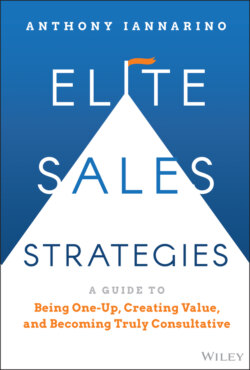Читать книгу Elite Sales Strategies - Anthony Iannarino - Страница 11
Inventory: Are You One-Down?
ОглавлениеWhile you may need to be temporarily One-Down as your contacts teach you about their company and their industry, staying in that position will harm both you and your clients. To avoid that outcome, you need to be aware of several beliefs and behaviors that would keep you One-Down. Meeting these threats is well worth your time and effort.
No Relevant Knowledge. At the most basic level, you're One-Down when your prospects know more than you do about the decisions they need to make. Knowledge about your own company and its solutions won't dig you out of that hole, since no one hires a guide who knows even less than they do. You don't need to be a know-it-all to correct this imbalance but you do need to be someone who knows “a lot in this area.” Eventually, you must become an expert to be One-Up.
Not Recognizing the Factors for Decisions. An inability to recognize the factors that your clients must consider will make it impossible for you to be One-Up. Decision makers make decisions. You are One-Up when you enable good decisions.
No Depth of Understanding. You might think that the value you create for your clients is found in your solution. You may even pride yourself on your ability to discover a problem. This legacy approach no longer creates a preference to buy from you because it doesn't give your contacts what they really need from you: insight. One of the things that makes you One-Up is your ability to help your client better understand their world and the nature of their problem, so you can create the certainty necessary to move forward in an uncertain world.
Not Learning from Your Experiences. One-Up salespeople recognize that selling is a craft, not just a job. If you're not mindful about your successes and failures, you will have a lot of trouble putting in the effort and care you need. Mastering your craft requires that you learn from your experiences, so you can apply what you have learned in a way that benefits your clients.
Outdated Sales Approaches. Today, how you sell is more important to your success than what you sell. Legacy approaches are too transactional to provide clients the expertise and advice they need, so relying on them puts you One-Down from the start. You are One-Up when your approach creates so much value that your client won't even consider buying from someone else.
A Lack of Confidence. Confidence is necessary to action, both in terms of taking the right actions and of doing anything at all. Without confidence in your own advice and expertise, you can't convince your client that you're the right person to help them improve their results. A client who needs certainty to move forward will avoid buying from a salesperson who creates uncertainty.
Desperation for a Deal. The greater your need to create or win a deal, the easier it is for your client to recognize that you are One-Down. Fearful behavior projects a lack of power and competence, one often stemming from desperation to meet a quota. To be One-Up, your need for a deal cannot exceed your client's need for your consultation. The remedy here is to create so many opportunities that you never need your client's deal more than they need you.
Fear of Your Client. Most salespeople who prospect by email are One-Down, perhaps fearing that making a phone call will somehow harm them. That's an odd fear for a professional salesperson, given that every good thing that ever happens to you in sales is the result of meeting a stranger! You can never be One-Up if you fear your contacts: you will not be able to lead them or provide them with the guidance they need. Instead, you should fear failing them, something that is all but certain if you stay One-Down.
Compliance at All Costs. Fearful salespeople often shrink back from leading their clients. Instead, they will do their very best to be compliant, following the client's lead and taking their orders. Perhaps you started your career as a fast-food cashier, but you don't have to stay there! Being One-Up means leading the client through their decision because you have the better vantage point: you know more than your client about how they should go about pursuing better results.
Conflict Aversion. The customer is not always right: at times, your client will want to do something that will harm their results or prevent them from improving their results. A One-Down salesperson will see the problem but choose to avoid the conflict of pointing it out, passively watching their client make mistakes. But when your client is wrong, they need someone One-Up and unafraid to correct them. Here being One-Up requires that you exercise diplomacy, pointing out the problem without battering your contact's ego.
Avoiding Responsibility. As humans, we're adept at blaming anyone and anything else for our mistakes, including losing a big contract. Avoiding that responsibility is a sure sign of being One-Down: chances are, you lost that deal because you couldn't create the greater value your client needed from you. Being One-Up means accepting the belief that if you are responsible for your wins, you must also be responsible for your losses. Only when you accept both types of responsibility can you look for ways to improve your results.
If these characteristics and practices sound all too familiar, you've got some work to do. That's where the rest of this book comes in: you'll find the strategies, tactics, and some talk tracks that will provide you what you need to be One-Up.
